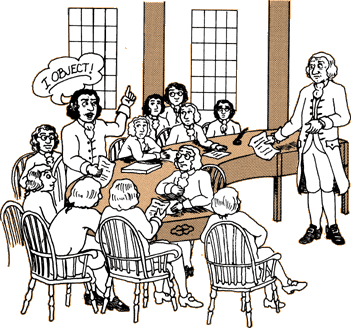Making A Nation
Lesson One
"THE GREAT BUSINESS
NOW BEFORE US"

READ AND DISCUSS
(in small groups)
I. In 1787 America was having big problems. There was no single type of money, or currency, in the new nation. States were arguing over trade issues and local boundaries. Each state seemed to see itself as independent and self-governing rather than as part of one country. If America were to survive, this situation could not continue.
It was time to create a strong central government that would unify the states. For this reason,
a meeting known as the Federal Convention was held in Philadelphia. The states sent some of their most experienced politicians and thinkers as representatives, called delegates, to the Convention. Among the Virginia delegates were George Washington, James Madison, and George Mason.
What was the situation in America that led to the Federal Convention?
II. George Mason came to the Federal Convention for two reasons. He wanted the new nation to succeed. He was especially troubled by the poor relations among the states. As a planter who owned land in several states, he was aware of the problems that arose in trade when states did not cooperate with each other.
Mason knew that the delegates at the Federal Convention were faced with an enormous job. He commented, "The Revolt from Great Britain, & the Formations of our new Governments at that time, were nothing compared with the great Business now before us."
Why was it difficult to create a strong central government in America in 1787?
III. Delegate Mason was practical and cautious. He was concerned that one man, or group of men, would take control of the government. Along with some of the other delegates, he supported a three-part political system with checks and balances. The purpose of these checks and balances was to limit the power of any one part of the system. Mason believed that the strength of the government came from a force outside it -- the people. These innovative ideas provided the basis for the new government.
What did Mason think might happen in the new government? What did he support to prevent this from happening?
IV. Although Mason approved of many aspects of the Constitution, he refused to sign it in the end. He wrote a list of objections. At the top of his list was the statement, "There is no Declaration of Rights." Mason believed that without a bill of rights, the people were not protected from a powerful government.
Mason was in the minority on this issue, however, and the Constitution was approved by the delegates. It then went to the state legislatures for their approval, called ratification.
When Mason refused to sign the Constitution, he took a stand that set him apart from almost all the other delegates. Have there been times when you have made an unpopular decision? How did you feel? Do you think Mason felt this way?
V. Mason and other Virginians fought in their state against ratification of the Constitution. The Virginia legislature finally ratified the Constitution after this promise was made: a national bill of rights would be discussed in the first Congress.
Other states echoed Mason's call for a bill of rights. Congress began debating this issue in 1789 and two years later, a bill of rights was added to the Constitution. Mason's great idea became a reality.
Mason tried to persuade Virginians not to ratify the U.S. Constitution. Do you agree with this action? Why or why not?
Would you like to learn more about the U.S. Constitution? Pick up The Constitution and The Bill of Rights, both by Warren Colman (Children's Press); A More Perfect Union: The Story of the Constitution, by Betsy and Giulio Maestro (Greenwillow); Shh! We're Writing the Constitution, by Jean Fritz (G.P. Putnam's Sons); or We the People: The Constitution of the United States of America, by Peter Spier (Doubleday and Co). Especially good readers might want to read The Great Constitution: A Book for Young Americans, by Henry Steele Commager (Eastern Acorn Press); The Living Constitution: Landmark Supreme Court Decisions, by Peter Sgroi (Messner); or A Part of Something Great, by Jerry Aten (Good Apple).
 
|

